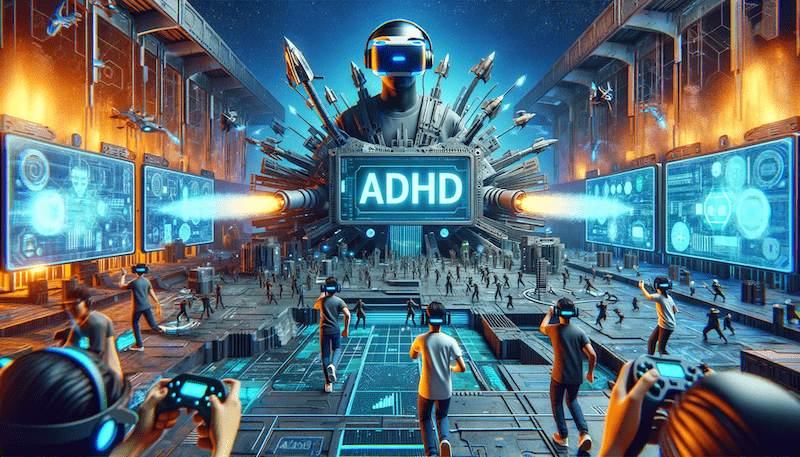Virtual reality game to objectively detect ADHD
January 3, 2023 - Reading time: 4 minutes

Attention Deficit Hyperactivity Disorder (ADHD) is one of the most common neurological disorders in children and adolescents. It is characterized by short attention span, hyperactivity and impulsive behavior. Traditionally, diagnosis of ADHD was done through subjective evaluation of behavior through interviews and observation.
This often resulted in misdiagnosis or under/over diagnosis. But now scientists have developed a virtual reality game that can objectively measure the symptoms of ADHD with great accuracy. In this blog post, we’ll discuss how this game works and what it could mean for the future of diagnosis and treatment for ADHD.
Researchers have used virtual reality games, eye tracking and machine learning to show that differences in eye movements can be used to detect ADHD
While previous studies have relied on self-report or parent report measures to establish a diagnosis of attention-deficit/hyperactivity disorder (ADHD), this new study utilized advanced technology in the form of virtual reality games, eye tracking, and machine learning to create an objective measure of the condition.
The research team found that individuals with ADHD made more saccadic eye movements – rapid, jerky eye movements – than those without the condition. Furthermore, they were able to use machine learning to develop a model that could accurately diagnose ADHD based on these differences in eye movement.
This study provides strong evidence that virtual reality gaming can be used as an objective measure of ADHD. This is significant because it means that we now have a tool that can be used to accurately diagnose the condition, without relying on self-report or parent report measures which are often subjective and can be biased.
The virtual reality games and ADHD
There is a strong correlation between ADHD and video game playing. Studies have shown that those who suffer from ADHD are more likely to be heavy gamers. While the jury is still out on whether or not this is cause and effect, the fact remains that many people with ADHD find relief and a sense of calm in playing video games.
This is where virtual reality games come in. VR games provide an immersive experience that can help to focus the mind and provide a distraction from intrusive thoughts. In one study, participants who played a VR game for just 20 minutes showed significant reductions in symptoms of ADHD.
While more research needs to be done, VR games show promise as a potential treatment for ADHD. If you or someone you know suffers from ADHD, consider giving VR gaming a try.
How the game works
The game, which is still in development, is designed to work with any virtual reality headset. To start, the player dons the headset and enters a virtual world. In this world, the player is presented with a series of challenges to complete. Each challenge is designed to test a different aspect of attention and impulsivity. For example, one challenge might require the player to catch a series of falling objects, while another might have the player navigate a maze while avoiding obstacles.
After completing the challenges, the player is given a score that reflects their performance on each task. This score can then be used to objectively detect ADHD. The developers of the game are currently working on validation studies to ensure that the game accurately detects ADHD.
Pros and cons detecting ADHD using VR
There are many potential benefits to using virtual reality (VR) games to detect attention-deficit/hyperactivity disorder (ADHD). VR provides an immersive and engaging environment that can help to keep children with ADHD focused and motivated. Additionally, VR games can be customized to specifically target the symptoms of ADHD, such as inattention and impulsivity.
However, there are also some potential drawbacks to using VR games for ADHD detection. First, VR games may not be able to accurately capture all aspects of ADHD. For example, symptoms of inattention can be difficult to quantify in a virtual environment. Additionally, the use of VR games for diagnosis may lead to overdiagnosis of ADHD. Finally, VR games may be expensive and not widely available, which could limit their utility as a diagnostic tool.
Virtual reality technology has the potential to revolutionize how we diagnose and treat ADHD. By allowing us to objectively measure behavior in a fun and engaging way, VR games offer an exciting new tool for doctors and parents that could help with early detection of ADHD symptoms. Through such creative use of modern technology, we can make more informed decisions about our health and well-being than ever before – enabling us to live better lives with greater peace of mind.

